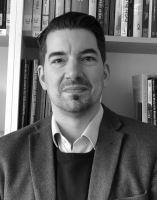Dr. Daniel Witte

Areas of Interest
- Sociological Theory and Relational Sociology
- Theories of Social Differentiation and Comparative Differentiation Research
- Comparative Macrosociology, Globalization and Transnationalization
- Intersections and Interactions Between Religion, Law and Politics
- Sociology of Culture and Knowledge
“Neutral zones” as a Third Space Between Religion and Non-religion
The project to be worked on during the fellowship is dedicated to the development of the theoretical figure of “neutral zones” in the context of comparative differentiation and secularity research. From the beginning, the discourse on secularization and secularity has been characterized by the basic idea of a binary oppositional relation, which currently often takes the form of a relation between the religious sphere and "non-religion" (or the provinces of meaning designated as “religious” in concrete socio-cultural contexts and their respective “others”); these and related dichotomies typically act as research-guiding two-sided distinctions. Against this background, empirical studies then deal with questions of the demarcation between religion and its “others”, with processes of boundary shifting (classically, for example, in the form of a loss of social influence by religious actors and institutions), with social conflicts that ignite at and over these boundaries, and so on.
From the perspective of social theory, the project will take various empirical irritations from recent literature as an opportunity to question the scope of sociological distinctions such as “sacred” vs. “profane” or “religion” vs. “non-religion” in their binarity and to ask about the significance of “neutral zones” in the sense of third spaces. The guiding idea here is the heuristic assumption that social boundary conflicts between religion and non-religion can often only be permanently contained if a space is inserted between these two spheres that is, as it were, kept open to interpretation, that is withdrawn from manifest conflicts over interpretational sovereignty and in which expectations of ambiguity are institutionalized. The analytical starting point of these considerations is a model of attribution practices, in which actors, practices, objects and tempo-spatial arrangements are distinguished as objects of social attributions. This raises questions, for example, about the congruence of attributions of these different entities, about their respective exclusivity or graduality, and about possible forms of “legitimate indifference” to unambiguous attributions. Over the course of the fellowship, these theoretical figures will be further elaborated and their analytical fruitfulness will be explored in confrontation with different empirical case studies.
Biography
Executive Board Member of the German Sociological Association (GSA/DGS)
Spokesperson of the Sociological Theory section of the German Sociological Association (GSA/DGS)
Lecturer, Institute of Political Science and Sociology, University of Bonn (Germany)
Visiting Scholar, Centre européen de sociologie et de science politique (CESSP), Universität Paris-Panthéon-Sorbonne/Centre national de la recherche scientifique (CNRS)/École des hautes études en sciences sociales (EHESS), Paris (France)
Interim Professor for Sociology with a Special Focus on Sociological Theory and History of Social Thought, Institute of Sociology, Goethe University Frankfurt (Germany)
Visiting Scholar, Berkley Center for Religion, Peace & World Affairs, Georgetown University, Washington, D.C. (USA)
Lecturer, Institute of Sociology, University of Duisburg-Essen (Germany)
Visiting Lecturer, Departamento de Sociología y Comunicación, Universidad de Salamanca (Spain)
PhD (Sociology), University of Bonn (Germany)
Research Coordinator, Käte Hamburger Center for Advanced Study „Law as Culture”, University of Bonn (Germany)
Research Assistant and Research Associate, Institute of Political Science and Sociology, University of Bonn (Germany)
M.A. (Sociology, Political Sciences, Psychology), University of Bonn (Germany)
Relevant Publications
- Witte, Daniel. “Prospects for a Relational Sociology of Islam: Some Remarks on Differentiation Theory, Multiple Modernities, and the Pitfalls of Occidentalism.” In Exploring Islam beyond Orientalism and Occidentalism: Sociological Approaches, edited by Christel Gärtner, and Heidemarie Winkel, 65–88. Wiesbaden: Springer VS, 2021.
- Witte, Daniel, and Andreas Schmitz. “Relational Sociology on a Global Scale: Perspectives from Field Theory on Cross‐Cultural Comparison and the Re‐Figuration of Space(s). ” In “The Refiguration of Spaces and Cross-Cultural Comparison II,” edited by Nina Baur, Stephen Mennell, and Angela Million. Thematic Issue, Forum Qualitative Sozialforschung 22, no. 3 (2021): Art. 5.
- Witte, Daniel, Christian Schneickert, and Andreas Schmitz. Das Feld der Macht: Eliten – Differenzierung – Globalisierung. Wiesbaden: Springer VS, 2020.
- Witte, Daniel. “Between Embeddedness and Conflict: Legal Contexts of Religion.” In Religion in Context, edited by Annette Schnabel, Melanie Reddig, and Heidemarie Winkel, 223 –38, Baden-Baden: Nomos, 2018.
- Witte, Daniel, Andreas Schmitz and Vincent Gengnagel. “Pluralizing Field Analysis: Toward a Relational Understanding of the Field of Power.” Social Science Information/Information sur les sciences sociales 56, No. 1 (2017): 49–73.
- Witte, Daniel, and Werner Gephart, eds. The Sacred and the Law: The Durkheimian Legacy. Frankfurt am Main: Vittorio Klostermann, 2017.
- Witte, Daniel. “Umstrittene Grenzen: Das Feld der Macht als Ort von Deutungskämpfen um Recht und Religion.” In Rechtsanalyse als Kulturforschung II, edited by Werner Gephart, and Jan Christoph Suntrup, 357–91. Frankfurt am Main: Vittorio Klostermann, 2015.


